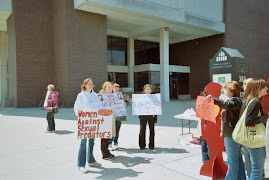ISP child-porn deal sparks censorship fears
Posted Thu Jun 12, 2008 12:02pm AEST Updated Thu Jun 12, 2008 2:14pm AEST
Some advocacy groups fear the ISPs' move to block child porn sets a dangerous precedent for censorship.
In a first for the United States, three internet service providers (ISPs) have agreed to block access to web sites that show child pornography, however not everyone is welcoming the move, with some groups claiming it raises censorship issues.
It may seem like an altruistic move, but ISPs Time Warner, Verizon and Sprint, were forced into the landmark agreement by New York Attorney-General Andrew Cuomo.
It took an eight-month undercover investigation in which his officers posed as subscribers to the ISPs.
When the officers' complaints to the ISPs that they were allowing child pornography online were ignored, the Attorney-General threatened to charge the companies with fraud.
Now they have come on board and offered the non-government organisation, the Centre for Missing and Exploited Children, more than $US1 million to set up the scheme.
Parry Aftab is an internet privacy and security lawyer and the founder of internet safety advocacy group, wiredsafety.org and he says the agreement means child pornography could potentially be wiped from the networks.
"What they've done is they've agreed to stop allowing anyone to access the channels that are frequently used for child pornography, and to use technology and people to help ferret it out wherever it is on their network," he said.
"Children are exploited and killed often in the making of child pornography."
However, the move has raised concerns over censorship, with some advocacy groups fearing it sets a dangerous precedent.
Mr Aftab agrees that issues have been raised as to whether or not it is appropriate that a non-government organisation potentially decides what is and what is not child pornography.
"The US National Centre for Missing and Exploited Children is non-governmental and governmental," he said.
"It was created by a special act of congress, so although it is a non-profit it is also government controlled.
"It's our official tip line in the United States on child pornography and it acts as a quasi-governmental unit in many cases.
"Everything's regulated, if you're a charity then you're regulated, but yes it is regulated and overseen by the Government here."
However the website for the National Centre for Missing and Exploited Children claims it is a private, non-profit organisation with a congressional mandate.
Australian censorship fears
The fact that a private organisation can essentially act as an official censor is why anti-censorship lobby group Electronic Frontiers does not want to see a similar scheme set up in Australia.
The organisation's chairman, Dale Clapperton, says ultimately the agreement is a bad move.
"First and foremost placing the decision over what type of material is or is not child pornography in the hands of a non-governmental, non-transparent, non-accountable private organisation is fundamentally a bad move," he said.
Mr Clapperton refers to the recent uproar over photographer Bill Henson's artwork which raises issues of defining child pornography.
"We've just recently seen in Australia the consequences of what can happen when an organisation such as this gets a bee in its bonnet about something they believe is child pornography," he said.
"If this type of scheme was replicated in Australia, potentially access to all of his [Bill Henson's] artworks would be blocked."
The head of the School of Information Systems at Deakin University, Professor Matthew Warren, is another critic of the US system, but for technical reasons.
"The reason why it's flawed is that it will only stop the access of these types of images via user groups," he said.
"The flaw with the American approach is that it doesn't focus on blocking inappropriate internet websites."
Professor Warren argues that the Federal Government is coming up with a better system to stop the spread of child porn on the internet.
"The new Rudd Government is now in the process of implementing the strategy that will filter into their content at the internet service provider levels," he said.
"So it means that people will have a clean feed of internet content to their site.
"The problem that's been raised with that is that you'd actually slow down the internet."
Dale Clapperton argues the Australian approach is also flawed and says it will be difficult to ever fully prevent people from accessing child pornography on the internet.
"I don't think that anybody is pretending for a moment that implementing this scheme here, such as they are going to do in New York, or what Labor has proposed, that Australia is actually going to be effective at preventing people from accessing child pornography on the internet," he said.
Hungry Wolves
-
This world really is sick and diluted with power hungry wolves who devour
any thing in their path.
As I look for the outcome of so many missing Childre...
2 years ago



No comments:
Post a Comment